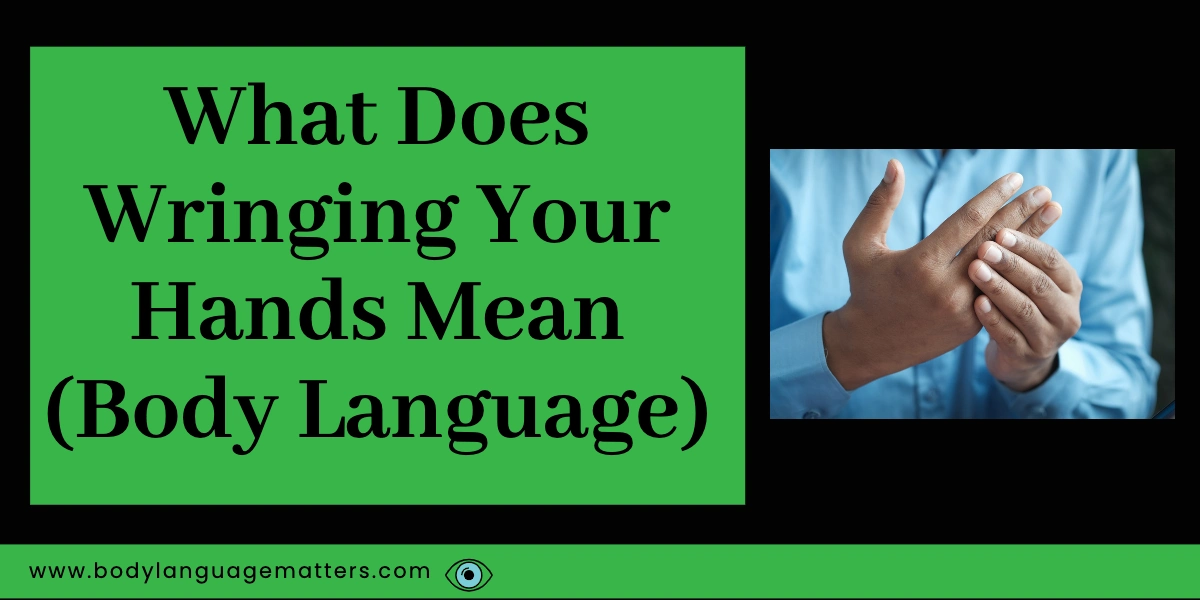In this article, we will explore the meaning and significance of hand-wringing and how to use it to express how we feel.
The phrase “wring your hands” means to move your hands in a way that causes them to twist together and squeeze. This can be done to express worry, frustration, or anger.
For example, you may see someone wringing their hands if they are worried about the future of our company and its future success.
- What does wringing the hands look like in body language?
- Why Do We Do Hand Wringing?
- Where Do We See Hand Wringing Most Often?
- Is hand wringing an open or closed body language gesture?
- What is the body language associated with wringing your hands?
- Why do people wring their hands?
- What are the different interpretations of wringing your hands?
- What are the cultural differences in wringing your hands?
- Is hand wringing a sign of deception?
- Summary
What does wringing the hands look like in body language?
Imagine clasping your hands together, rubbing them back and forth. Alternatively, you can cup your hands together and rub them up and down.
What does wringing your hands mean?
Wringing your hands can be means of expressing anxiety, stress, or frustration. It can also be a way of gaining attention. Generally, people wring their hands when they feel hopeless or helpless in a situation. This gesture is usually paired with other body language cues, such as pacing, fidgeting, or averting eye contact.
That is why it’s best to gain a basic understanding of a person before we start to read people.
Why Do We Do Hand Wringing?
Hand-wringing is a gesture that can have many meanings. It could be used as a way of pacifying one’s behavior, or it could be utilized to calm oneself down or regulate one’s feelings. This can also be seen as a self-touch for reassurance, like a time when their parents would hold their hands to reassure them.
Where Do We See Hand Wringing Most Often?
We will sometimes see people wringing their hands when they are nervous, afraid, or in a situation, they cannot control. This is called a “cue” for when bad news is delivered.
Is hand wringing an open or closed body language gesture?
The body uses hand-wringing as a coping mechanism for these feelings. If you see hand-wringing in someone you know and the individual seems on edge, consider trying to stop that behaviour. The reason we want to defuse this behavior is that the person you are talking to may not be as respectful as you would like them to be.
Top Tip.
“When you see hand wringing, the loser is the better. If you see the hands tighten up over time, that person is becoming more stressed or angry. Pay more attention to when you see wrist wringing and what’s being said”.
What is the body language associated with wringing your hands?
There is no definitive answer to this question as body language is highly contextual and can vary significantly depending on the person and the situation.
However, some common interpretations of wringing one’s hands may include swaying from side to side, going red in the face from embarrassment, or hanging the head in shame because of a feeling of guilt. You may often see hand-wringing when someone is upset or feeling negative about something.
Why do people wring their hands?
There are a few reasons why people might wring their hands. One reason could be that they are nervous or anxious about something. This could be because they are in a situation that makes them feel uncomfortable, or because they are anticipating something that they are dreading. Another reason for wringing.
What are the different interpretations of wringing your hands?
Wringing your hands can indicate that you are anxious, nervous, or stressed about something. It can also be a gesture of frustration or anger. The context around where you see the gesture will give you a clue as to why a person is wringing their hands together.
What are the cultural differences in wringing your hands?
There are no significant cultural differences in wringing your hands. The gesture is generally understood to indicate nervousness, anxiety, or stress.
Is hand wringing a sign of deception?
Hand wringing is a common sign of anxiety or stress. It can be a sign of deception in the sense that someone may be trying to appear more nervous than they really are, but there are other reasons for this behavior.
There are many psychological factors that can contribute to hand wringing, and it’s not always an indicator of lying that’s why we need a good baseline on a person and to understand the context of the situation before we can make a judgment.
However, most experts believe that wringing the hands together is a deceptive nonverbal cue in a cluster of other body language shifts.If you would like to learn more about spotting a liar, check out this article here.
Summary
Wringing one’s hands can be a gesture that is seen as a close-off gesture or a more negative nonverbal cue, and can be seen by others as a sign of weakness. If you see this gesture and it becomes heightened or a person is over-rubbing their hands together, you know they are becoming more stressed. If you have enjoyed reading this article, please check out other similar ones here.

